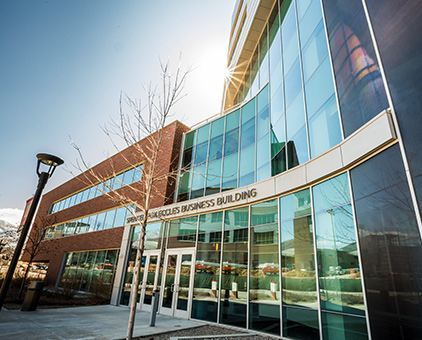Health and Kinesiology
Emphases: Nuclear Medicine Technology
Bennion
Center
Capstones
Program
1078
Declared
Majors
32
Average
Class Size
Courses
Getting Started
- Complete H EDU 1010 - Health Lifestyles, WRTG 2010 - Intermediate Writing, MATH 1050 - College Algebra, COMM 1270 - Analysis of Argument, & a Stats class
- Meet with an advisor to plan courses & get info about the NMT track
- Discuss program specifics with the NMT program director
Making Progress
- Schedule department observation with the NMT program director
- Prepare application materials to apply for the Nuclear Medicine Technology Emphasis; due April 1st every year
- Take a Chemistry class along with Gen Ed & elective courses
- H EDU 1950 - Emergency First Aid
- H EDU 3030 - Medical Terminology
- BIOL 2325 - Human Anatomy
- BIOL 2420 - Human Physiology
Finishing Up
- Complete core classes following the recommended sequence
- Finish an internship
- Prepare for & schedule certification exams
- Apply for graduation
Community
Getting Started
Connect with a range of diverse health-related communities:
Making Progress
- Go to your student Activity Fair & consider joining a club that interests you
- Get to know the students in your classes & start building community on campus
- Attend a Learning Abroad 101 session to learn about programs, processes, & planning
Finishing Up
Apply your knowledge by taking on more influential roles:
- Coordinate a group service project
- Volunteer your time with the Bennion Center
Knowledge & Skills
Getting Started
- Learn to use online tools like CIS, & My Degree Audit
- Attend major exploration events
- Visit with your advisor to create an academic plan
- Connect with support resources like the Writing Center & Math Lab
Making Progress
- Organize a study group
- Attend office hours
- Touch base with your advisor to stay on track
- Explore & register for electives that support your learning goals
- Develop your knowledge through an independent study
- Seek out applied experience through job shadowing, community service, leadership, & direct patient & client exposure with organizations like Connect2Health & Primary Children's Medical Center
Finishing Up
- Practice what you learned & share your knowledge in a real world setting such as an internship or a collaboration with a Kinesiology community partner
Transformation
Getting Started
- Meet with an advisor to begin exploring where you want to go after you graduate & learn how to customize your undergraduate experience to meet your goals
Making Progress
- Try some of the co-curricular activities offered through College of Health like a CEL course or a supervised internship
- Connect with student support services on campus like the Student Success Coaches
- Try extracurricular activities outside the major through the Bennion Center, ASUU, the Natural History Museum, or the Huntsman Cancer Institute
Finishing Up
- Complete the capstone course & put theory into practice by working with under-served populations in the community
- If you've done research, consider presenting at the Undergraduate Research Symposium
Impact
Getting Started
- Participate in the "Be Well Utah Health Fair"
- Find health-related student groups like SPEAK & Students for Choice
- Attend a MUSE Casual Friday
- Connect with a peer mentor through the U of U mentoring program
Making Progress
- Get valuable experience with an internship through the Hinckley Institute, PEAKFitness, or Skaggs
- Take more responsibility in extracurricular activities - apply for leadership positions in clubs
- Look into summer jobs in health professions by talking to your Career Coach
- Volunteer in organizations on campus & in the community like U-Fit, Utah Reads, Science in the Parks, Connect2Health, or Friends for Sight
- Get valuable experience with an internship through the Hinckley Institute, PEAKFitness, or Skaggs
Finishing Up
- Visit with your Career Coach or a Pre-Professional Advisor to discoveropportunities to gain additional skills & experience through volunteering, jobshadowing, clubs, or internships
Careers
Getting Started
- Take Focus2 or the StrengthsFinder assessments through the Career & Professional Development Center to get to know yourself better
- Use O Net & Who Hires U of U Grads to research career options
- Meet with a Career Coach for guidance
Making Progress
- Explore by completing informational interviews, shadowing, volunteering, or working in areas of interest
- Use career events (Career Fairs/Meet & Eats) & resources (Handshake/Forever Utah) to get connected
- Develop back-up plans for your primary career goal
- Get your resume/LinkedIn reviewed & build references & contacts for the job search
- Attend the Career Conference to get all of these at once
Finishing Up
- Meet with a Career Coach to refine your job or graduate school application materials
- Practice interviewing
- Practice salary negotiation
Start Your Career Journey
Find support at the Career and Professional Development Center (CPDC)
About the Major
Learning Outcomes
- Gain relevant skills in computer processing and image enhancement.
- Prepare and administer radioactive chemical compounds, known as radiopharmaceuticals.
- Perform patient imaging procedures using sophisticated radiation-detecting instrumentation.
- Provide images, data analysis, and patient information to the physician for diagnostic interpretation.
- Learn to effectively interact with patients.
Plan & Prepare
At the U, we plan for our students to have an exceptional Educational Experience identified by four broad categories we call the Learning Framework: Community, Knowledge & Skills, Transformation, and Impact. This major map will help you envision, explore, design, and plan your personalized Exceptional Education Experience with the Learning Framework at the core. In addition to assisting you in planning your coursework and navigating the requirements of your major, this map will help you incorporate other kinds of experiences to expand your knowledge, support your development, and prepare you for the future you want.


